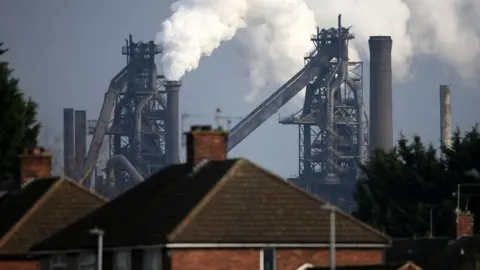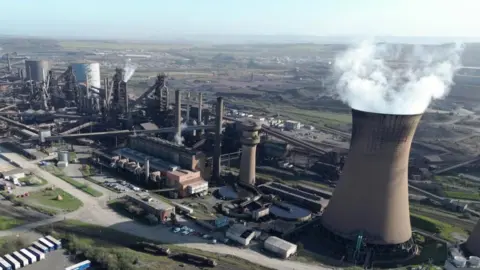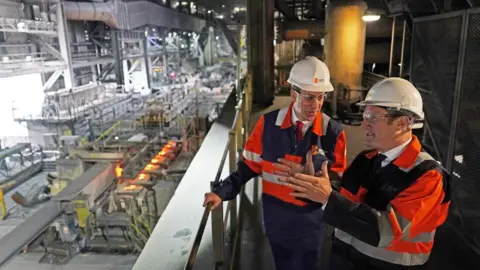Why did the government take control of British Steel?
 Getty Images
Getty ImagesThe UK government has taken control of British Steel's plant in Scunthorpe, Lincolnshire, after it was put at risk of imminent closure.
MPs were called back to Parliament on Saturday from their Easter break to pass an emergency law that handed control of the Chinese-owned site to the government, in order to keep its two blast furnaces operating.
What is British Steel and how many people work there?
British Steel's plant in Scunthorpe, Lincolnshire, employs 2,700 people, about three-quarters of the company's entire workforce.
It is the last plant in the UK capable of producing virgin steel, which is used in major construction projects like new buildings and railways.
Two huge blast furnaces are used to produce the steel, which has fewer imperfections than the recycled steel made elsewhere in the country.
Were the plant to cease producing virgin steel, the UK would become the only member of the G7 group of leading economies without the ability to make it - a prospect the government views as a risk to the country's long-term economic security.
Who owns British Steel and has it been nationalised?
The company was founded in 2016 when Tata Steel sold its loss-making long products division in Scunthorpe to private investment firm Greybull Capital for a token £1.
The new owners renamed the business British Steel.
Following a period of financial instability, British Steel was taken over by the government's insolvency service in 2019 and then acquired by Chinese steel-making firm Jingye the following year.
In late March 2025, Jingye said the plant was losing around £700,000 a day and launched a consultation on its closure.
The government held talks with Jingye aimed at keeping the plant operational.
After these appeared to have largely broken down, emergency legislation was fast-tracked through Parliament in a single day on Saturday - handing control of the plant to the government.
Jingye still owns the site, but the business secretary now has sweeping powers to control management and workers to make sure production continues.
This means British Steel has not been nationalised - which is when a government takes ownership and control of a company.
But Business Secretary Jonathan Reynolds acknowledged that public ownership was "the likely option".
While the government hopes to secure private investment to save the plant, ministers admit there are currently no companies willing to buy it.
 Reuters
ReutersWhy did the government step in?
The supplies needed to keep the blast furnaces running - coking coal and iron pellets - are running low at the Scunthorpe plant.
This added time pressure to the talks, because once a blast furnace shuts down it is a costly and complex process to restart it.
Unions said the situation was on a "cliff-edge," while the Community Union described the lack of supplies as an "extreme emergency".
The government offered to buy the raw materials needed to keep the furnaces running earlier this week, but Jingye did not agree to that proposal.
In the Commons on Saturday, the business secretary said Jingye had wanted "an excessive amount" of money.
He said it had become clear during negotiations that the company intended to "refuse" to buy enough material to keep the furnaces running, and "to cancel and refuse to pay for existing orders".
"The company would therefore have irrevocably and unilaterally closed down primary steel making at British Steel," he added.
The emergency law gives the government the ability to order raw materials to keep the furnaces running, and to direct the company's workforce and board.
The government has told the company's UK management to keep the site operational, and the new law will ensure that any employees who are sacked by the Chinese owners can be reinstated.
 Getty Images
Getty ImagesWhy is the Scunthorpe plant losing money?
Jingye said the blast furnaces were "no longer financially sustainable," blaming "highly challenging" market conditions, tariffs and costs associated with transitioning to lower-carbon production techniques.
UK steel production has been falling for several decades and the financial pressures facing the industry were heightened in March when the US imposed a 25% tariff on any steel it imports.
Global over-production of steel has created "a glut of steel on the international market", according to a UK government briefing on the industry, which has pushed prices down. British manufacturers also face higher costs, particularly on electricity, than elsewhere.
Who else produces steel in the UK?
There are 1,160 businesses in the UK steel industry, directly supporting 40,000 other firms across the country, according to government figures.
Tata Steel at Port Talbot in Wales was once the UK's largest virgin steel producer but it turned off its blast furnace in September 2024, saying it was losing £1.7m a day.
An agreement with the UK government was reached which saw it commit £500m to help the company move to greener forms of steelmaking.
Other steelmakers in the UK include Liberty Steel, Celsa, Marcegaglia and Outokumpu.
Liberty Steel also has a plant in Scunthorpe which is facing closure. More than 120 jobs are at risk, with bosses blaming high energy costs.
In 2023 the UK steel industry contributed £2.3 billion to the UK economy - equivalent to 0.1% of total UK economic output and 1.0% of manufacturing output.
In the same year, the UK produced 5.6 million tonnes of crude steel, or 0.3% of the world's total. In comparison, China produced more than 1,000 million tonnes, 54% of global production.
The EU produced 126 million tonnes of steel in 2023, 7% of the world's total. Compared with EU countries, the UK ranked as the eighth largest steel producer, after Germany, Italy, Spain, France, Austria, Poland and Belgium.
